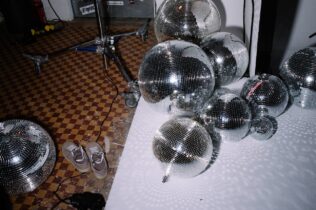
Photo by Jess Loiterton.
We’re back to hollering at our neighbours from the front steps. Bouncing on socked feet, and asking the question of the hour.
“Think the kids’ll go back in Jan?”
The parents on our street are all playing a game of over-under. Will the kids go back on time? And, if they get punted to virtual school, how long before they are back in a classroom?
But even for the folks who don’t have school-age kids, we’re still hollering guesswork. About Christmas and case counts and how the next little bit will play out. And how hard it is to know what the right thing is anymore.
And specifically, the thing all our neighbours are pointing to is this. It’s really hard to make plans when everything keeps moving.
We’re startup people. Our whole life is making plans when all the context keeps shifting. But this feels different. The issue isn’t an ability to pick a direction or make a decision. It’s an inability to predict the future. Where that decision will either be exactly right or utterly irrelevant.
Four weeks ago, we turned our gym membership back on and started the absurdly competitive process of finding a swim lesson slot. Like every other family up here, we’re about 2 years behind on swim skills. And then one day, we refreshed the page and all the listings were blank. The pools had shut down again.
So Swim Lessons goes back on the family todo list. An empty box beside it and a slack reminder to refresh the registration page again in a few weeks.
As we write this, a lot of people we know are testing positive for COVID, and quite quickly. Depending on where you are in the world, maybe that’s true for you, too.
From this place of “future shit we can’t predict” and “present shit we don’t have any control over,” it can feel downright despondent. But there’s a tool we reach for (both at work and at home) in cases like this that often helps. If you’re heading into the new year, angry at the prospect of setting resolutions or goals with no fucking clue, read on.
You can’t be right if you can’t be wrong
Strategy folks love to talk about assumptions. It feels like a very Businessy thing to do. “Before we dive into planning and goal-setting,” goes the advice, “let’s each write down the assumptions we’re making.” After all, if the assumptions are faulty, we should be able to see that easily. It will help us avoid building bad plans on a faulty foundation.
It sounds good. But if you’ve ever been part of one of these exercises, you know it rarely works. Because it misunderstands humans.
In most planning contexts, leaders walk in already armed with a strong sense of what they want to commit to. The assumptions they write down lead to the place they already want to go. And those assumptions are written in a way that makes them basically impossible to disprove.
-
We assume that COVID will be around for a long time.
-
We assume that we want our business to keep existing.
-
We assume that children should know how to swim.
We know this. In past lives, we were the ones writing assumptions like this.
It’s not that the exercise is useless. It is valuable to capture how you’re thinking about the world right now. It contextualizes the plans you make. So that your team, or future you, can know what the hell past you was thinking. It’s just also really easy to game it.
The less game-able version takes those assumptions and turns them into predictions.
Putting the clear in clairvoyant
Assumptions and predictions are two tools to get at the same thing. Both try to crystallize how you think about the world today, in case it changes. But writing down an assumption is passive, it’s descriptive. Making a prediction is active. It asks you to apply your assumptions, to test them and see if they hold up. And the result is that, whether you end up right or not, you learn from them.
The process of making a good prediction starts with the “what.” Pick something that’s looming, taking up brain cycles, messing with your ability to plan. COVID. School closures. Swim lessons.
Now comes the hard work. Write down the strongest, falsifiable prediction you can make, and see how you feel about it. It’s strange, but it often takes us several tries to write a prediction we actually agree with. Something about the act of writing it down, and then staring at it, tests our intuition.
-
Swim lessons will be cancelled until outdoor pools can open.
-
Swim lessons will be back in 3 weeks.
-
Swim lessons will resume once schools go back to in-person.
Next start to pull in the timeline until it’s uncomfortable. For us, there seem to be sweet spots around 4 weeks out, and again at about 6 months. But your own set points might be different. The goal, in any case, is to pull your predictions in. Partly to sharpen them, and partly to reduce the window until you learn whether you’re wrong.
If you made a prediction for 2022, what can you say about June? If you made a prediction about June, what can you say about January?
-
Swim lessons will resume once schools go back to in-person.
-
And school will be virtual for at least 4 weeks.
-
And school will not be virtual for more than 3 months.
-
And school will be virtual for 2-6 weeks.
These specific predictions might be right or wrong. If you check yourself on them, the predictions that miss are as useful as the ones that hit. Both help calibrate you, and make you better at the next round of predictions. Both help cut through social and media bubble influence and ground your intuitions in what’s actually happening in the world. Every prediction is a feedback loop, and you get to make as many as you like.
Prediction is a practice
Getting good at predictions doesn’t make you psychic. But it sometimes feels that way. By the time a thing comes to fruition, you’ve often spent some time thinking about it, imagining a world where that’s true. And so when it does happen, it seems like you’re three steps ahead.
This is a superpower. There’s a reason everyone from comic book characters to sci fi heroes to greek gods all use it as a plot device. Because if you could actually see the future, you could make plans, or cancel the plans that are clearly not going to happen. You could be decisive instead of waiting to see how it goes.
Prediction is a practice. Our version sometimes involves a pour of whisky after the kids are asleep, but you do you. Once we get to clarity on our predictions, we find we’ve also got clarity on what we need to do next. Our new year’s wish for you, especially after the last two years, is that you find some of that clarity, too.
Thank you for sharing space in your inbox this year, and for forwarding this newsletter around. It means so much to us to know when it connects. Stay safe out there. Happy new year.
– Melissa and Johnathan






